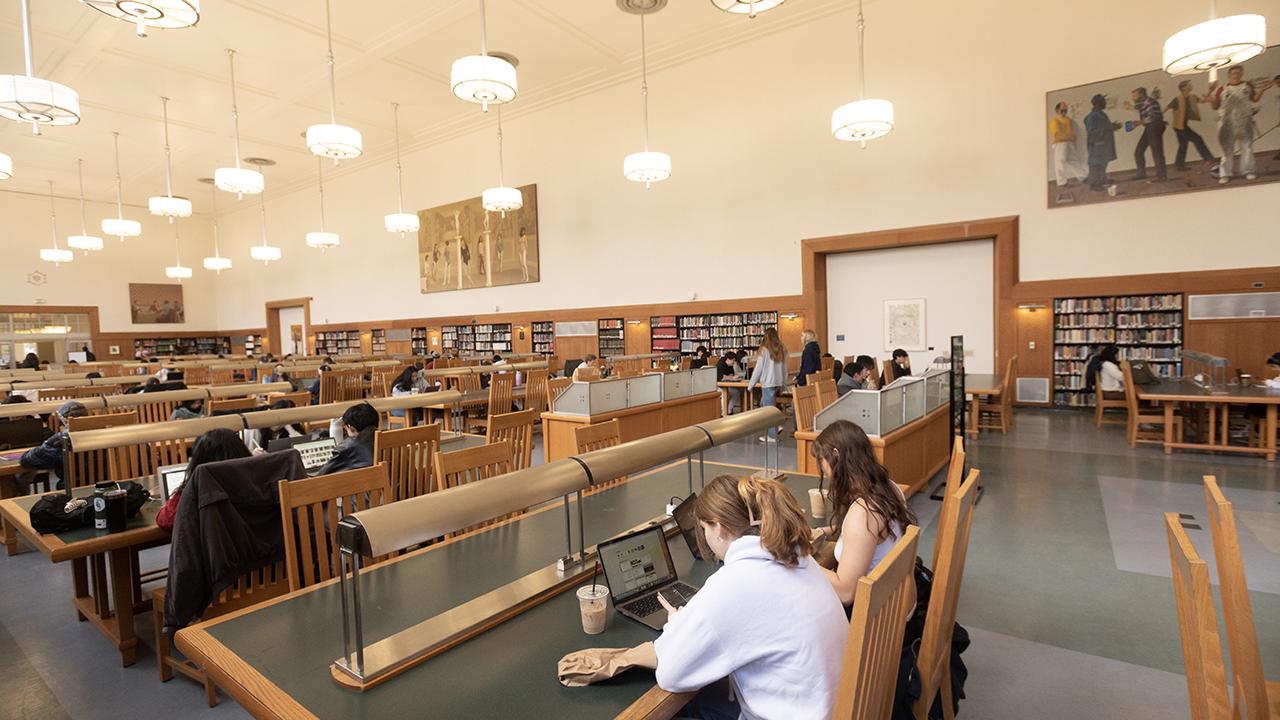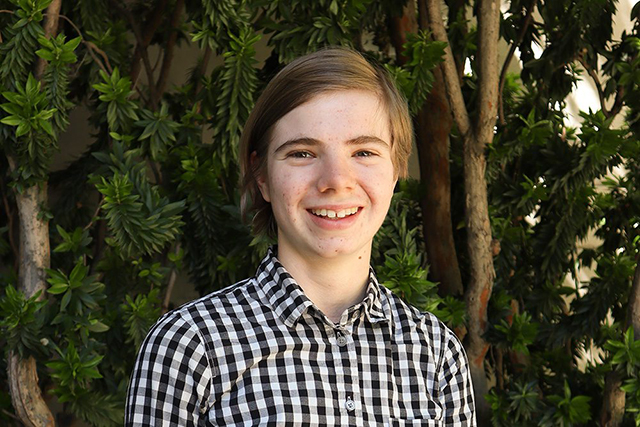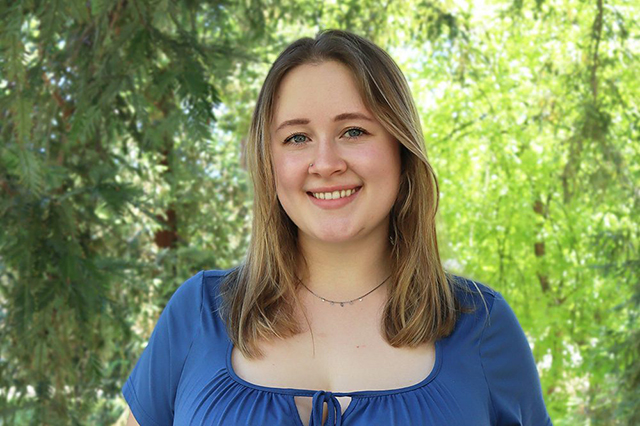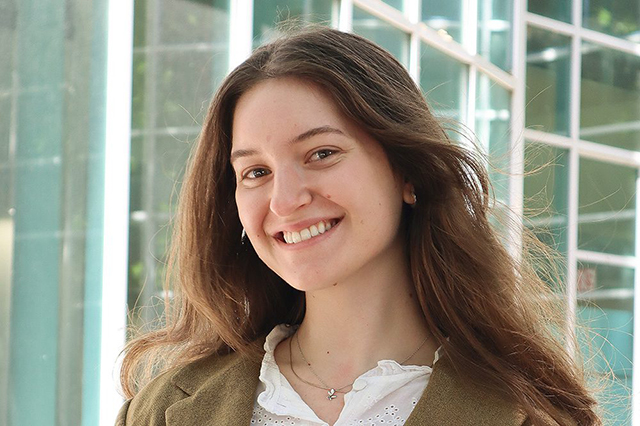
Prize recognizes students who make exceptional use of library resources and service
Five students from the College of Letters and Science were awarded the Norma J. Lang Prize for Undergraduate Information Research. Annabel Marshall, Celeste Palmer, Aubrey Hart, Jacob Klein and Lilly Tisza all won awards in the category of Arts, Humanities & Social Sciences.
The Lang Prize is supported by a bequest from the late Professor Emerita of Botany Norma J. Lang, who taught at UC Davis for nearly 30 years, and honors her devotion to her students and love of the research process. The prize, now in its eighth year, recognizes students who make exceptional use of library resources and services.
Annabel Marshall

Annabel Marshall, a recent graduate with a double major in cognitive science and English, received a first place Lang Prize for her independent research project on American poetry. Her thesis, “Toward an infinity of wavering susceptible variables: Camp, Audience, & Productive Distortion in John Ashbery’s The Vermont Notebook,” explores the poetry of John Ashbery in relation to the camp aesthetic.
“I was interested in defining how Ashbery’s use of camp in poetry was not just a byproduct of his sexuality, but a deliberate and nuanced choice that reflected his understanding of language,” Marshall wrote.
“Through my research, I came to the conclusion that Ashbery’s poetry reflects an understanding of language as productive distortion,” she wrote. “That is, as something that inherently twists and expands, rather than reflecting reality perfectly.”
Marshall credits her ability to do so much independent research to the resources and support available through the library. In addition to reading literary criticism about Ashbery’s work, Marshall developed her own analysis by reviewing an illustrated copy of The Vermont Notebook in the library’s Archives and Special Collections. Theatricality & Absorption, a book on eighteenth century art criticism she borrowed via Interlibrary Loan, helped shape her final argument.
Marshall has written extensively for The Aggie. She’s also been an ASPIRE Research Scholar, Provost's Undergraduate Fellow and an Undergraduate Research Intern at the Feminist Research Institute.
Celeste Palmer

Celeste Palmer, a recent graduate, received a first place Lang Prize for her research on the influence of French imperialism in Mexico. In her work, Palmer makes connections between France's colonial relationship with Algeria in North Africa and its invasion of Mexico in the 1800s.
In her thesis, “Mexican Fertility, Agricultural Regeneration, and French Informal Imperialism in Mexico, 1861-1867,” Palmer examines the attitudes underpinning 19th-century French imperialism in Mexico, particularly the belief that the natural environment was fertile but was "abandoned” by the indigenous population.
“This ‘fertility myth’ wrongfully posited that Algeria was uniquely fertile in ancient times but that indigenous nomads had since destroyed the country’s forests and turned them into desert,” Palmer wrote. “I noticed parallels between this portrayal of the French colony and French sources’ characterization of Mexico’s environment.”
The project, which required going through sources written in English, French and Spanish, was “incredibly ambitious,” Palmer wrote upon reflection.
“I can confidently say that if not for the resources available to me through the UC Davis Library, researching this thesis would have been impossible,” she wrote. Palmer also conducted primary source research using digitized Mexican government archives and French government documents at the Archives National and the Archives des Affaires Étrangères à La Courneuve in Paris.
Palmer majored in history with a specialization in Latin American history. During her time at UC Davis, Palmer worked as an undergraduate student assistant at the Hemispheric Institute on the Americas.
Aubrey Hart

Aubrey Hart, a recent graduate, received a second place Lang Prize for her senior capstone project “Music Therapy in the US Healthcare System: Past, Present and Future.”
Her project explores the historical use of music as an instrument of healing and the evolution of music therapy. She integrates the works of ancient philosophers, modern scientific studies and interviews with researchers in music therapy to propose a solution to make music therapy more accessible to people in the United States.
“The history of music therapy doesn’t have an extensive amount of research on it, and the topic of reimbursement surrounding music therapy has even less,” Hart wrote. “While these challenges were initially difficult, I overcame them by using the databases I could access through the library.”
Hart credited Student Services Librarian Ruth Gustafson for helping her navigate the wealth of resources the library had to offer.
“I really didn’t start using the library as a resource until this project and I really, really, really wish that I had started doing that sooner,” Hart said.
Jacob Klein

Jacob Klein, a rising junior majoring in political science – public service, earned a second place Lang Prize for his project, “Transecting Russell Boulevard,” which led him to not only hit the pavement but also the library’s Map Room.
In order to learn more about how the landscape of Davis has changed in the last 100 years, Klein embarked on a walking tour that spanned a five-mile stretch of Russell Boulevard.
“I was interested in analyzing how this five-mile transect changed over time, comparing the evolution of the agricultural landscape in the west to that of the urban landscape in the east,” Klein wrote. With the help of Student Services Librarian Sheena Campbell, Klein looked at maps of the area dating back to the 1870s.
In addition to the landscape, Klein's journey led him to explore the overall history of Davis as well as its architecture and people. His project was for the Landscape Architecture course "LDA 002, Place, Culture & Community."
Lilly Tisza

Lilly Tisza, a rising junior in the Department of Design, took a third place prize for her project, “Human-Centric Research in Energy Retrofitting Methodology for Historic Architecture.”
Due to climate change, there is a need to prepare buildings, especially historical ones, for its impacts as well as increase the energy efficiency of such buildings. However, in her research on the topic, Tisza realized there was a gap in the existing literature when it comes to how the retrofitting process, like installing energy-efficient appliances and shifting to renewable energy sources, effects people and communities.
"The existing research relied on statistical, quantitative data and there was little qualitative research done to measure the effects of these energy retrofits," Tisza wrote.
To develop a research proposal to address this need, Tisza reviewed journal articles and case studies, interviewed a faculty expert, and designed a qualitative methodology for site visits. She also conducted interviews with building users and local industry professionals.
“The topic of my research paper spans various fields, which required me to research within a multidisciplinary framework to form my literature review,” Tisza wrote. “I had to dabble in academic journals with subjects in engineering, architecture, design, policy, historical conservation, etc.”
Tisza is majoring in sustainable environmental design and design.
